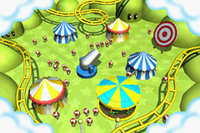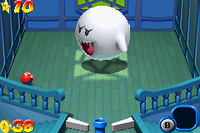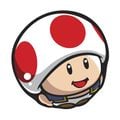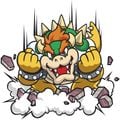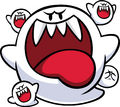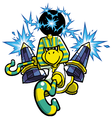Mario Pinball Land
- This article is about the 2004 Game Boy Advance game. For the microgame in WarioWare: Move It!, see Mario Pinball Land (microgame).
| Mario Pinball Land | |||||||||||
|---|---|---|---|---|---|---|---|---|---|---|---|
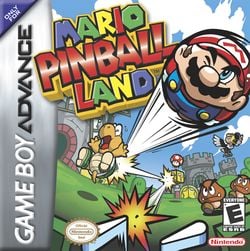 For alternate box art, see the game's gallery. | |||||||||||
| Developer | Fuse Games | ||||||||||
| Publisher | Nintendo | ||||||||||
| Platform(s) | Game Boy Advance, Virtual Console (Wii U) | ||||||||||
| Release date | Game Boy Advance: Wii U (Virtual Console): | ||||||||||
| Language(s) | English (United Kingdom) English (United States) Japanese | ||||||||||
| Genre | Pinball | ||||||||||
| Rating(s) |
| ||||||||||
| Mode(s) | Single player | ||||||||||
| Format | Wii U: Game Boy Advance: | ||||||||||
| Input | Wii U: Game Boy Advance:
| ||||||||||
| Serial code(s) | |||||||||||
Mario Pinball Land (known as Super Mario Ball in Japan and Europe) is a pinball video game that was developed by Fuse Games and published by Nintendo for the Game Boy Advance and was released in 2004. It was rereleased on the Wii U's Virtual Console in Europe and Australia on September 11, 2014; in Japan on September 17, 2014; and in North America on November 27, 2014.
Story
From the instruction booklet:
Princess in Peril!?
During the unveiling ceremony for the new "Sky Cannon" at the Fun Fair, Princess Peach was accidentally blasted off to Bowser's castle! The Sky Cannon, an amazing new transportation device that launches people to new destinations, got off to a rocky start because of this shocking turn of events.According to eyewitnesses, the mishap occurred when a pair of shady Goombas altered the cannon's direction. Within moments, they had locked up the castle, with Princess Peach trapped inside!
Mario to the Rescue!
Without a moment's hesitation, Mario leapt into the cannon to rescue Princess Peach. If Mario collects four Star Keys, he'll be able to get into Bowser's castle. To do that, he'll need to confront many challenges and defeat the bosses who hold those keys! Will he be able to rescue Princess Peach?How Does it Work?
Before you can ride the Sky Cannon, a special "Pinballer" squeezes you into ball[sic], so that you can fit into the cannon's barrel. The Pinballer also makes you surprisingly rubbery, so that you bounce harmlessly when you land!
The story takes place in an amusement park called the Fun Fair. Mario, some Toads, and Princess Peach are waiting in line to try a ride called the Sky Cannon. To ride it, the rider must be turned into a ball first via the Pinballer, after which they are shot out of the cannon. The Toad who tries it first has fun. As Peach is about to take her turn, two Goombas appear and change the direction the cannon is aiming toward Bowser's castle. Mario then uses the Pinballer to turn into a ball himself to go save Peach.
At the end of the game, Mario confronts Bowser inside his castle. When Bowser is defeated, he is launched out of the castle. Mario and Peach, after returning to normal, are riding the roller coaster on the final screen.
Gameplay
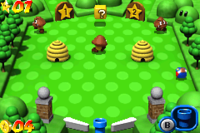
Mario Pinball Land is a pinball game featuring elements of the Super Mario franchise. The player controls Mario, who takes on the shape and is used as a pinball. The left and right flippers are used to hit Mario. He can earn points by hitting objects and enemies. There are five stages, each separated into a few areas, and they can be traveled to via the Sky Cannon. If Mario falls down the drain between the flippers at the bottom of a stage, he loses a life. At first, when Mario starts an area, there is a blue Pipe in between the two flippers to protect him from falling down. After a certain amount of time, the Pipe disappears. Every stage (except the Fun Fair) has a few paths, each obstructed by a door that requires a number of Stars to open, like in Super Mario 64. Once the door is open, Mario can take the path and continue to the next area. If Mario falls down the drain in a following area, he returns to the previous area, where the enemies and objects are reset. In a few cases, falling down the drain in a following area sends him back two areas.
Whenever Mario defeats an enemy, it drops a coin, although if it is part of a streak (done by defeating more than one enemy before touching the bottom of the screen), the enemy instead drops a Blue Coin. If Toad appears, Mario can hit him to enter his tent, where Toad offers a few items for sale. Mario can buy only one item with the coins he has collected. After he does so, the item he bought is displayed at the bottom right corner of the screen up until he uses it. Mario can also obtain items from a ? Block. Blue Coins can be spent only in the blue tent in the Fun Fair, and they are used to access three different challenges.
Mario can collect a Star by either defeating every enemy in an area, completing a challenge in the blue tent at the Fun Fair, or collecting every Red Coin in an area. There is a total of 35 Stars to collect. If Mario defeats every enemy in an area where he already collected its Star, a question mark appears instead. If Mario touches it, a roulette spins, and he obtains whichever item it lands on.
A boss appears in every stage, and defeating one yields a Star Key (along with several coins). There are four Star Keys, and each unlocks a boss statue in Bowser's castle. Once every statue is unlocked, Mario can face off against the final boss, Bowser.
There are two modes: Adventure and Time Attack. At first, only the Adventure mode is accessible. Mario can unlock the Time Attack mode once he has defeated at least one boss. The objective of Time Attack is to complete a stage as fast as possible.
Controls
 (up and down): Select menu options
(up and down): Select menu options : Launch ball, confirm
: Launch ball, confirm : Use item, cancel
: Use item, cancel (or left on
(or left on  ): Use left flipper, select left on target screen and shops
): Use left flipper, select left on target screen and shops (or
(or  ): Use right flipper, select right on target screen and shops
): Use right flipper, select right on target screen and shops: Pause game
Stages
Characters
Protagonists
| Image | Name | Description |
|---|---|---|

|
Mario | As the main protagonist and playable character, Mario goes on an adventure to rescue Peach, this time as a pinball. |

|
Peach | Once again having the role of damsel-in-distress, Peach is kidnapped by Bowser, and Mario has to save her. |

|
Toad | He runs a shop in a tent where Mario can buy an item (provided he has enough coins). |
Bosses
| Sprite | Name | Level |
|---|---|---|
| Petey Piranha | Grassy Greens Stage | |
| Porcupuffer | Frosty Frontier Stage | |
| Egyptian Koopa | Shifting Sands Stage | |

|
Big Boo | The Fun Fair |

|
Bowser | Fiery Stage |
Enemies
Items
- Coin – the main currency; allows Mario to buy items
- Blue Coin – allows Mario to play special minigames to earn Stars
- 1-UP Mushroom – gives the player an extra ball
- Pipe – puts a blue pipe on the bottom of the screen, preventing Mario from falling
- Yoshi Egg – gives the player a Yoshi Egg as a second ball
- Mega Mushroom – temporarily grows Mario to a larger size
- Invincibility Star – makes Mario invincible, allowing him to instantly defeat any enemies
- Mini Mushroom – temporarily shrinks Mario, allowing him to enter small passages
- Lightning – deals a hit to all enemies onscreen
- Special Egg – a red egg with white stars and the rarest item in the game (only four can be found); gives the combined effects of a Mega Mushroom, Invincibility Star, Yoshi Egg, and Pipe
Development
After Adrian Barritt and Richard Horrocks founded Fuse Games, they wanted to pitch a pinball game to Nintendo. Figuring that they needed to make an impact before Nintendo would speak to them, Barritt and Horrocks made a demo consisting of what they figured would be the first and last areas of the game. Afterward, they went to Seattle to pitch the game to Nintendo of America and were approved. The game was developed for the Game Boy Advance rather than the Nintendo GameCube due to Fuse Games' limited resources and due to the system's similarities to the Super Nintendo Entertainment System.
Mario Pinball Land was developed over the course of 18 months, from September 2002 when the company was founded to its completion in June 2004, and by a team of five people.[6] At an earlier point in development, the game was simply titled Mario Pinball before the name was changed.
Staff
- Main article: List of Mario Pinball Land staff
Mario Pinball Land was developed by Fuse Games, who would later go on to develop more pinball-based games for Nintendo. The entirety of the game was developed by Adrian Barritt, Richard Horrocks, Cai Remrod, Keith Ainslie, and Kevin Ayre. Shigeru Miyamoto was the game's main producer.
References to other games
- Super Mario Bros. 2: Cobrats appear as enemies in the Shifting Sands Stage.
- Super Mario World: The power-up, power-down, and bouncing sound effects are reused from this game.
- Super Mario 64: The numbered doors depicting stars are very similar to the ★ doors from this game. Big Boo, who first appeared in this game, appears as a boss.
- Paper Mario: Koopatrols appear as enemies in the Fiery Stage.
- Mario Party 4: The Mini Mushroom’s design comes from this game.
- Super Mario Sunshine: The coin, Shine Sprite, and pipe entrance sound effects, as well as the Boo's, Toad's, and Bowser's voices, were reused from this game. The sound effect for pausing the game is reused from the sound effect that plays when a Yoshi is hatched.
References in later games
- WarioWare: Move It!: A microgame based on Mario Pinball Land appears in this game, in which the player needs to hit a boss three times.
Reception
Mario Pinball Land received mixed reviews at launch. While most reviewers praised the game's graphics at release, the game was mostly criticized for its difficulty and overall gameplay. It was also criticized for its short length and relative lack of replay value.
| Reviews | |||
|---|---|---|---|
| Release | Reviewer, Publication | Score | Comment |
| GBA | Craig Harris, IGN | 5/10 | "A game can't live on pretty looks alone. Mario Pinball Land is a graphically amazing title, but the gameplay itself is far more flawed and annoying than it is fun to play. And considering Nintendo already successfully hit the pinball genre last year in Pokemon Pinball: Ruby and Sapphire, Mario-branded game is a large step backwards in game design. This game may have more pinball "challenges" than Pokemon Pinball, but when players have to struggle through some of the frustratingly bad design implementations, it's almost not worth the playtime." |
| GBA | Tom Bramwell, Eurogamer | 5/10 | "In the end it's far more frustrating than it should be, particularly given that it's an idea with so much potential - and Fuse Games clearly has come up with a lot of good ideas in making this. It's just hard to recommend when there are so many silly things working against it. Issues that should have been obvious to the people making it. It's also a bit short, although given that it's a pinball game and there's so much to do and collect there's obviously a fair amount of replay value herein. Not a complete balls-up then, but nowhere near as good as Nintendo's benchmark handheld pinball games, and if you're after a flipper-fest then it's to one of those that you ought to turn. And on that note, if you can't find monochrome Kirby's outing any more, don't be put off by the "Pokémon" part of "Pokémon Pinball"; it's actually a lot better than it sounds, and nudges Super Mario Ball right out of contention." |
| GBA | Frank Provo, GameSpot | 7.5/10 | "Nintendo has a knack for coming up with quirky games that are easy to pick up and play. The company's latest game, a funky fusion of Mario and pinball called Mario Pinball Land, is a good example. It combines the general concepts behind tabletop pinball with the characters and worlds from the Mario franchise to create a strange sort of adventure game that's fairly fun but a little on the short side." |
| Wii U VC | Alex Olney, Nintendo Life | 7/10 | "Super Mario Ball holds its own as an oddball (pun intended) of the Mario spin-off series – a wholly single-player experience with beautiful visuals and an interesting medley of Mario and typical pinball tropes. It's not without its flaws, and the gameplay may cause some to become more frustrated than perhaps is healthy, but the good experiences with this certainly outweigh the bad. Whilst you won't get a tremendous number of hours from it, it's a ten year old game that you can download for 20% of its original price, and that makes this off-the-wall title worth a look for anyone looking for a more challenging romp through the Mushroom Kingdom." |
| Aggregators | |||
| Compiler | Score | ||
| Metacritic | 62 | ||
| GameRankings | 64.75% | ||
Gallery
- For this subject's image gallery, see Gallery:Mario Pinball Land.
Media
- Main article: List of Mario Pinball Land media
| File info 0:30 |
| File info 0:30 |
| File info 0:19 |
| File info 0:30 |
Names in other languages
| Language | Name | Meaning | Notes |
|---|---|---|---|
| Japanese | スーパーマリオボール[?] Sūpā Mario Bōru |
Super Mario Ball |
Trivia
- The American English name is similar to that of a spin-off Kirby game titled Kirby's Pinball Land.
References
- ^ August 27, 2004. Gaming Life in Japan. Retrieved December 20, 2024.
- ^ Mario Pinball Land tilts into retail. Retrieved December 20, 2024.
- ^ Mario Pinball Land. Retrieved December 20, 2024.
- ^ Bramwell, Tom (November 26, 2004). What's New?. Retrieved December 20, 2024.
- ^ Super Mario Ball Shogakukan book.[page number needed]
- ^ Harris, Craig (September 20, 2004). Fuse Games on Mario Pinball. IGN (English). Retrieved June 27, 2024.
External links
- Japanese website
- Japanese Virtual Console website
- American English website
- North American Virtual Console website
- British English web page
